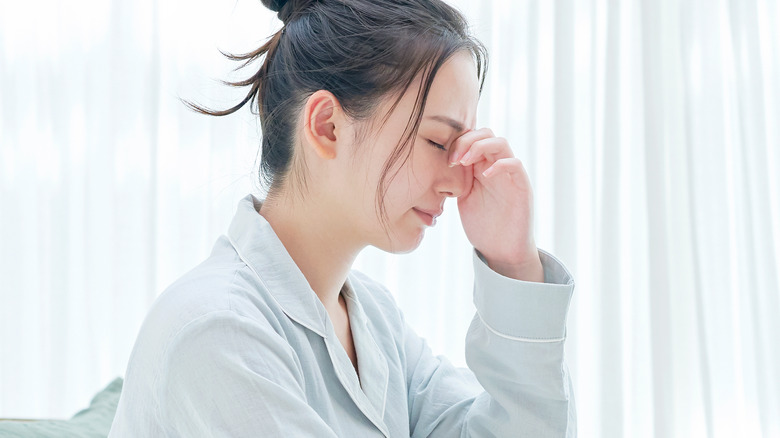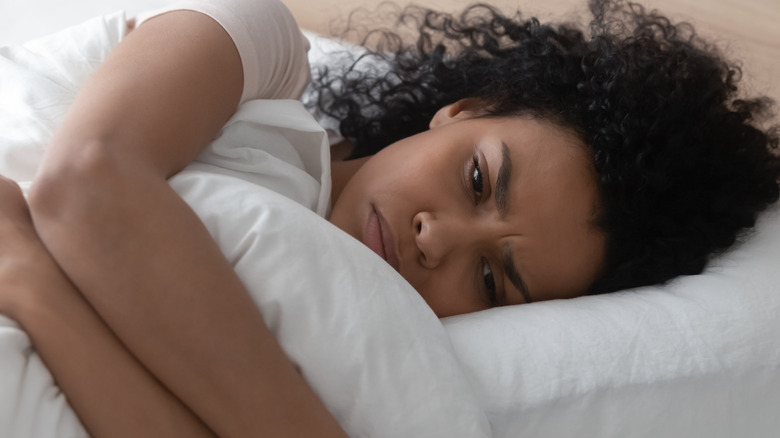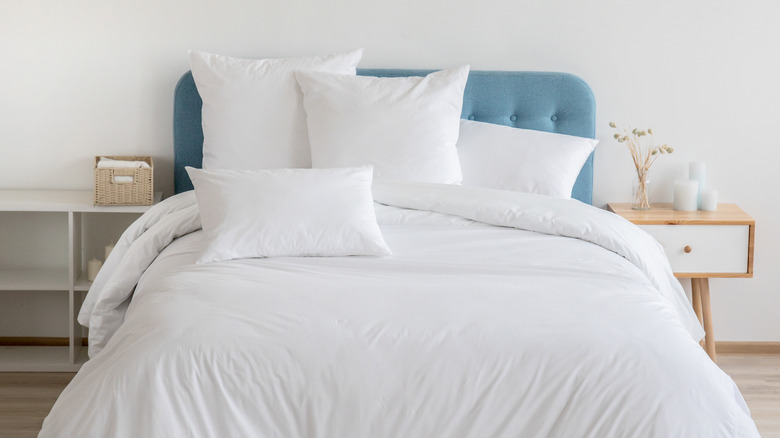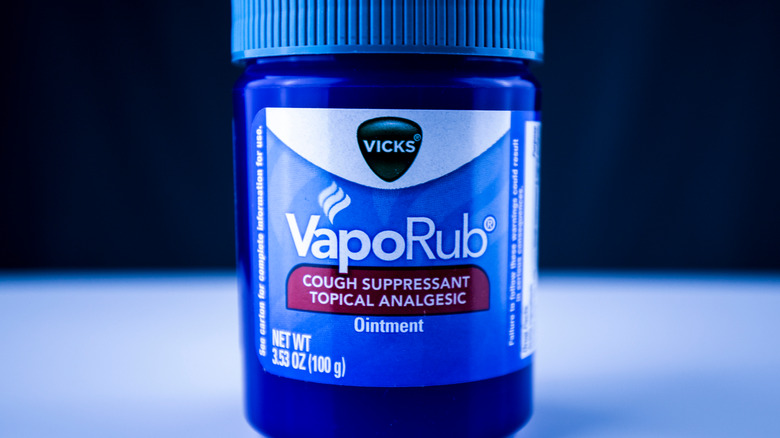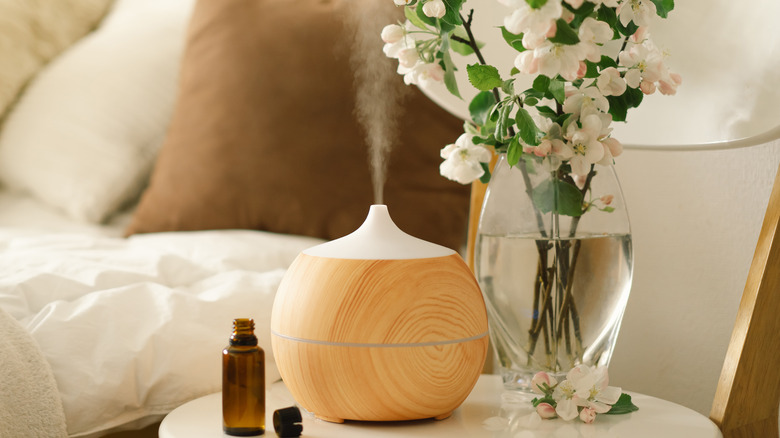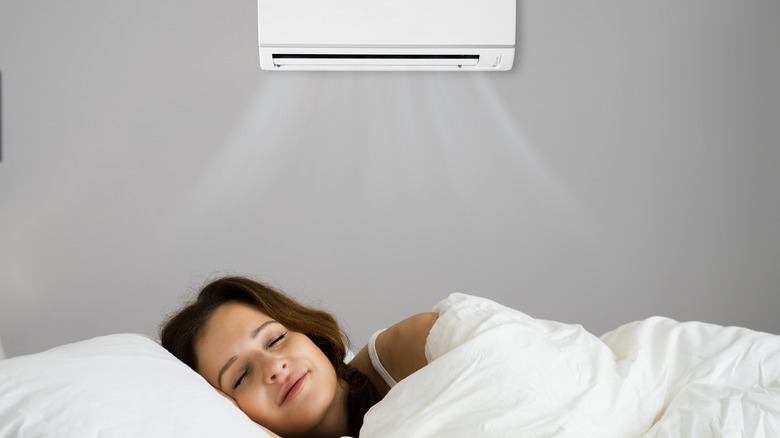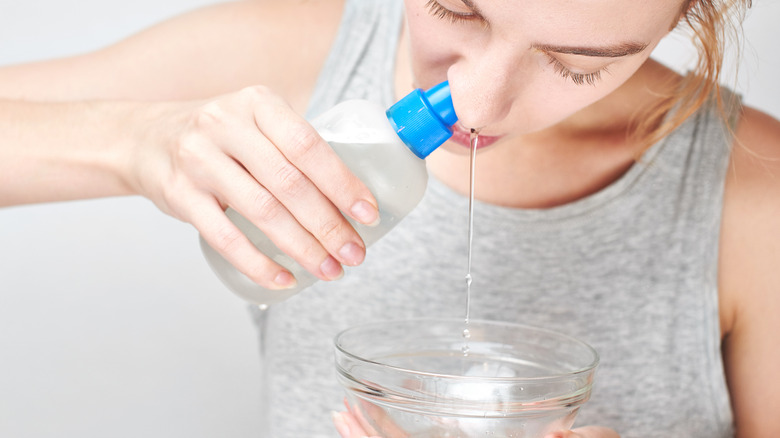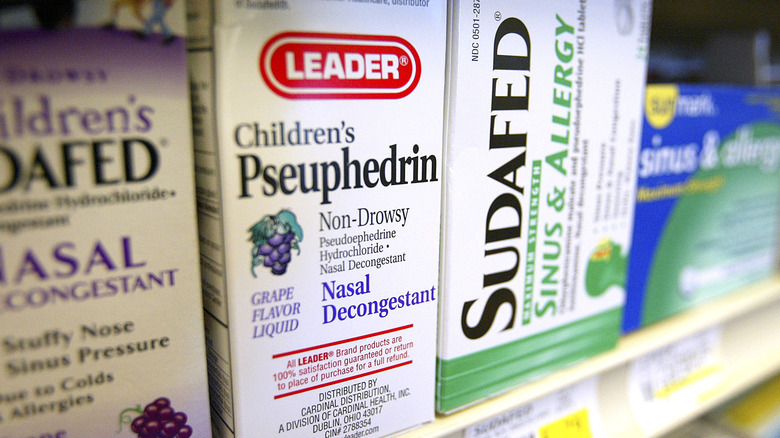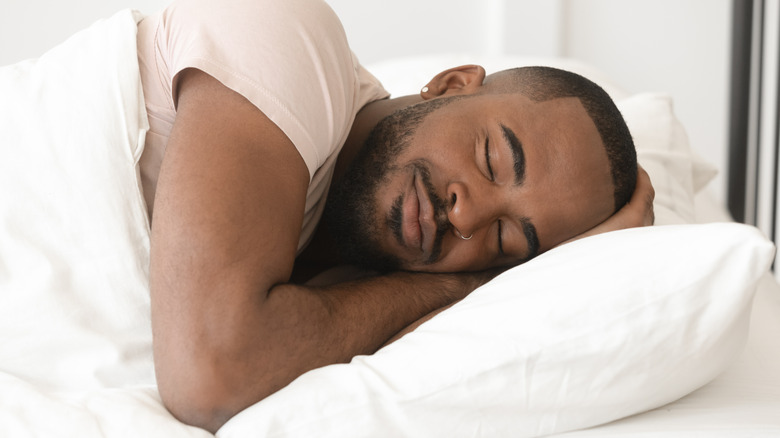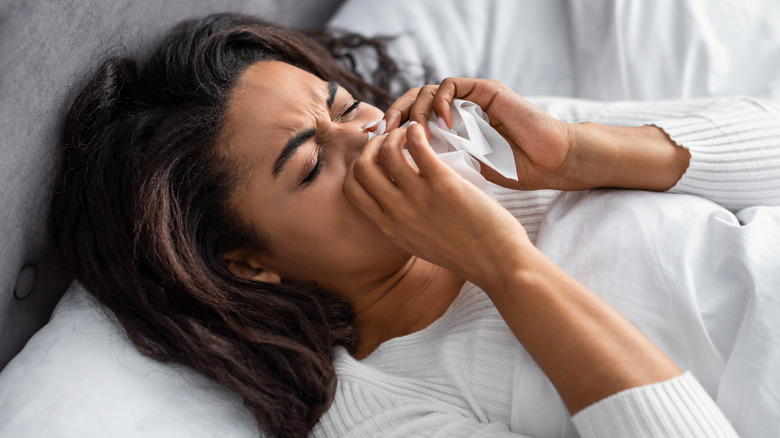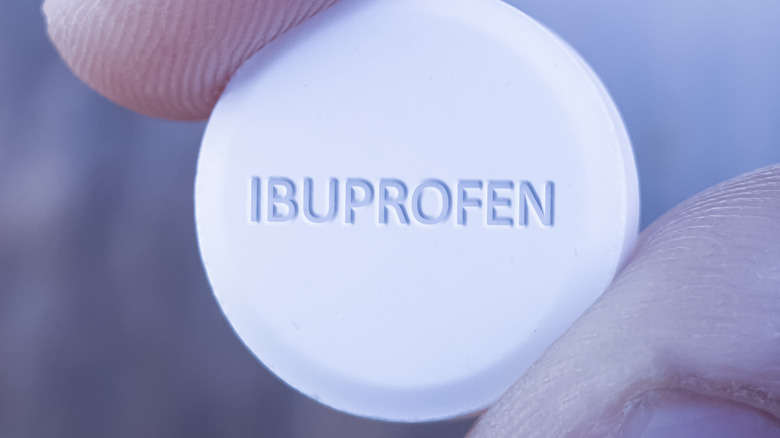13 Things You Can Do To Get Better Sleep When You're Sick
Life can get pretty annoying when you're sick. From a cold to a stomach bug, when we're laid up with something nasty, it can turn the easiest of everyday activities into a struggle of Herculean proportions, including the most basic (and for many, most satisfying) of functions: Sleeping. Getting to sleep and staying in slumber throughout the night can become one of the most frustrating aspects of battling sickness, and if you've ever found yourself staring at your alarm clock at 3 a.m. with a blocked nose and a pounding head, you'll know what we mean.
Before you reach for those cold meds, though, take a sec. It's certainly true that cold and flu medications can help you nod off. This is something that the marketers of these products have capitalized on to stunning effect, with the U.S. segment of the cold and cough remedy market reaching almost $14 billion in 2022 (per Statista). But those aren't the only things that can help.
There are many ways to ease your passage to a solid night's sleep that don't involve medication at all. In this article, we're going to take a look at some of the top methods to get a restful snooze when you're feeling under the weather.
Why is sleep so important when you're sick?
More often than not, the first thing that's prescribed to us when we're sick (either by a doctor or our moms) is rest. We know it makes sense, and we know it feels good — but why is it so important?
Well, when we're battling a sickness, our bodies are working to fight against the virus, releasing inflammatory mediators to battle the effects that the invading suspects are having on our system, explains sleep specialist and UCHealth pulmonologist Neale R. Lange (via Well+Good). These inflammatory mediators can make us feel more tired and sleepy, which is essential to allow the immune system to do its thing. "All the stages of sleep, particularly the deeper non-REM and REM stages, have active functions, initiating a drop in heart rate and blood pressure, and also allowing for the immune response that clears away toxins," says the Cleveland Clinic's Sleep Disorders Center director Nancy Foldvary-Schafer.
From releasing antibodies to delivering T-cells to lymph nodes to fight infection, our bodies work overtime to rid us of viruses when we're knocked out in slumber. When we don't sleep enough, however, not only do our bodies have a harder time doing this, but we're also increasingly at risk of higher inflammation — and therefore, a harder time fighting the sickness.
Got a cold? Grab some extra pillows
Trying to drop off when you have a cold is no fun at all. Not least because sometimes, the moment you lie down, a hacking cough causes all of your dreams of a good night's sleep to evaporate.
If you've ever wondered why that cough rears its head in full force when you lay down at night, it's all because of the build-up of mucus in the throat that occurs when you're horizontal, according to Healthline. Luckily, there's a solution for that: Get yourself an extra pillow or two, and prop your head up a little further than you normally would. This can not only ease your cough but also allow your sinuses to drain with more ease, reducing sinus pressure and any symptoms (headaches, blocked noses, difficulty breathing) caused by them, according to the experts at A. Vogel.
Just remember that you don't want to lift your head too much. That'll just make it harder to sleep, and potentially leave you with an aching neck in the morning. One or two additional pillows should do the trick.
Try peppermint tea for an upset stomach
When your stomach is doing somersaults — whether that be thanks to the flu, a seasonal bug, or some other ailment — sleep can feel like it's on the distant horizon. And for those times when your stomach just won't quit, peppermint tea may be your best friend.
Drinking a cup of peppermint tea can help to calm the stomach and reduce symptoms of nausea, the NHS states. This may be particularly helpful if your sickness is being caused by something in your lower gut, indigestion, or due to irritable bowel syndrome (per Everyday Health).
Additionally, unlike other teas, peppermint tea is naturally caffeine-free, explains registered nutritionist Nicola Shubrook (via BBC Good Food). This makes it a perfect choice for a soothing drink before bedtime. It's worth pointing out, however, that if you can't sleep due to stomach problems that are causing an effect on your upper gastrointestinal tract (such as heartburn as a result of GERD), peppermint tea may not be the best choice, according to Everyday Health. This is because the relaxing effects of peppermint can cause the sphincter between your esophagus and stomach to loosen, permitting more stomach acid to wash back through.
Have a hot shower to ease cold symptoms before sleeping
Honestly, there are few things we love more than a hot, steamy shower. And when you're sick, there's nothing you'll love more, too — especially when it's time to say goodnight.
A hot shower just before bed can help restore your body to its natural stasis when you have a cold, says Washington-based family and integrative medicine specialist Donald Novey to Everyday Health. "The body is 'cold' when you have a cold, and heat helps to energize, reduce symptoms, and relax muscles. This is one of the best ways to promote better sleep when you're sick."
Where a hot shower particularly excels itself is in its ability to assist your sinuses in clearing, says Medical News Today. The steam from the hot water provides moisture and warmth to your sinuses, helping mucus in your throat and nose to clear away. This can provide a decongesting effect, reduce pressure around the sinuses, and ultimately let you drop off to sleep faster and easier.
Grab yourself some VapoRub
Sometimes, with a cold, you just have to open up the medicine cabinet. And if you're finding it hard to get to sleep when you're sick, we'd advise you to reach for the VapoRub.
Vicks VapoRub, an aromatherapeutic medicine containing eucalyptus oil, camphor, and menthol, helps to ease coughs and throat issues, according to the Vicks website. By rubbing it onto your chest, you then breathe in the vapors that are released, which assist you in breathing more easily and nodding off to a more restful state of sleep (per Verywell Health).
This isn't just hearsay, either: research published in Pediatrics found that VapoRub that was applied to children's chests delivered a better night's sleep and more symptom relief than when using a simple petrolatum solution or no treatment at all. Just make sure you're putting it on your chest, though, and not anywhere else — ever heard that putting VapoRub on your feet will help that cold? While it might be something that your grandparents swore by, it's a course of remedy that has no scientific backing or study reinforcing it.
Fire up your humidifier
Few items are more trendy for a premium bedroom set-up than a humidifier. But that little object in the corner won't just serve as a conversation starter. When you're battling a cold, using a humidifier can help to increase the moisture levels in the air, potentially benefiting cold symptoms and relieving congestion, according to the Mayo Clinic.
Congestion can not only make breathing harder, but irritated nasal passages can become dried out and impacted by the presence of mucus — and using a humidifier can combat this, making dropping off to sleep easier (per Medical News Today). It's important to remember, however, that not all humidifiers are created equal for symptom relief. Although both cold-water and hot-water humidifiers will add moisture into the air, heated humidifiers may have less efficacy, and indeed, may not help with cold symptom relief at all (per the Mayo Clinic). It's also vital to remember to clean out your humidifier regularly, to prevent bacteria that can collect in standing water from being kicked out into the air.
Keep your bedroom cool
When battling a cold or the flu, there may be few things more tempting than a warm, cozy bedroom. But wait! Before you crank up the heating, it might be useful to know that maintaining a colder environment could be more beneficial to sleep.
Our bodies drop in temperature overnight, and maintaining an ambient temperature in a bedroom close to our resting internal temperature can help usher in a good night's rest (via Healthline). Ideally, keeping our rooms at around 18 degrees Celcius is optimal for some next-level zzz's.
But is that the same when you're sick? In some cases, yes, particularly if you have a fever. When you're battling a higher-than-average body temperature, keeping a cool environment around you can help you bring your fever down and provide comfort, says Vicks. Try replacing your regular duvet with a sheet that's less bulky, sleeping in fewer clothes than you normally would, or cracking a window open.
Use a saline solution to reduce congestion
As seasonal illnesses roll around, our noses can become our greatest enemies. They're stuffy they're runny, they're sneezing, and when we lie down at night, they won't let us breathe.
A simple and effective way to address our noses — and the congestion that they become riddled with when we have a cold — is by using a saline solution to irrigate our nasal passage. Essentially, nasal irrigation works by flushing the mucus out of our noses. A saline solution flows through, taking all of the congestive elements with it, and hopefully leaving us with a clearer passage, according to WebMD.
Nasal irrigation might have a fairly imposing name, but in reality, it's pretty simple to do. Take your desired container (either a bottle bought at the store that already contains a saline solution, or a neti pot or squeeze bottle filled with a basic solution of water, non-iodized salt, and a tiny bit of baking soda), and stand next to a sink. Lean over the sink sideways, so that your ear is facing into the basin. Place the spout of your container in your upper nostril, and squeeze the solution through, allowing it to run through the lower nostril and drain into the sink below. Repeat on the other side.
Ginger tea before bed can help prepare you for sleep when you're sick
The world is positively flooded with artisanal teas and new-fangled blends promising to heal whatever ails you. But when you've got a cold or the flu, there's no need to rush out and buy the latest trendy tea: If you've got a knob of ginger, you're already halfway to a peace-filled night.
Ginger tea can provide a natural reduction of aches associated with illness, according to family and integrative medicine specialist Donald Novey (via Everyday Health). The heat of the tea may reduce the effects of a runny nose and congestion, and may also just generally make you feel better.
And the good news is, making ginger tea is seriously easy, a bonus for anyone who can't stomach the thought of big tasks while sick. Chop up a piece of ginger (aim for one that's around 4 inches long), and boil it in a half-gallon of water for half an hour. If you want, you can throw in some honey for a bit of extra flavor; the honey may also help to relieve a sore throat, says Healthline. Just make sure that you're drinking it sometime before you hit the hay, as ginger tea can leave you with heartburn, making it a nightmare to sleep, warns Novey.
Don't be tempted by alcohol
We get it: Falling sleep when you're sick can be hard, annoying, and stressful — and sometimes, a nightcap might seem like just the thing to send you off. But we would advise against resorting to alcohol to sleep when you're sick, particularly if you're experiencing congestion.
Alcohol has a dehydrative effect, and this can exacerbate cold symptoms, making congestion even worse, according to WebMD. What's more, drinking too much alcohol can have an immunosuppressive effect, essentially making it harder for your body to fight the illness you're experiencing.
Alcohol also disrupts our sleep more generally, meaning that you may not be getting the necessary rest needed for your immune system to do its work. When you drink alcohol, you can imbalance your sleep patterns, particularly suppressing your amount of restful REM sleep, says the Sleep Foundation. All of this results in lower-quality sleep, sleeping for shorter lengths of time, and feeling less rested upon waking — all things you definitely want to avoid when you're not feeling your best already.
Avoid certain cold medications
Medication can be a serious godsend when your cold is causing woes, but when the end of the day comes, you're going to want to make sure you picked the right one.
Not all cold medication is created equal, and there are a fair few out there that may end up inhibiting your sleep. Some names to look out for are dextromethorphan (a cough suppressant), pseudoephedrine (a decongestant commonly sold under the brand name Sudafed), and loratadine or fexofenadine (which are antihistamines), according to WebMD. All of these medications may have a stimulating effect that can stop you from dropping off and may keep you awake at night.
Certain types of cold and flu medication, particularly those branded with "Daytime" or "A.M." in their names, may also contain caffeine, to help increase alertness and combat the sluggish feeling you get when you're sick (per Consumer Reports). Consuming caffeine too close to your bedtime may result in insomnia. By contrast, if you're looking for medication that will help you sleep, try seeking out "Nighttime" or "P.M." versions, avoid blends with caffeine, and try and prioritize treatments that contain drowsiness-inducing histamines like diphenhydramine (via WebMD).
Create a calming environment
Our bedrooms are our sanctuary from the world, a place to retreat and unwind. And when you're sick, having a relaxing haven waiting for you at the end of the day becomes even more important. Creating a serene setting for sleep can help us switch off when we're not feeling our best, with multiple factors like lighting, temperature, noise levels, and comfort having an impact on our overall sleep quality (via the Sleep Foundation). A quiet, slightly cooler room with low lighting and a supporting, comfortable mattress is the optimal setting.
In addition to making our bedrooms the most relaxing they can be, there are also certain things we can do in our preparations for rest that can assist our passage into sleep. Try putting on some calming music before bed, recommends family and integrative medicine specialist Donald Novey via Everyday Health. "If your mind is occupied with something else, it relaxes," says Novey. Incorporating a bedtime preparation routine involving some meditation, light yoga, breathing, or mindfulness practice may also help prepare your mind and body for a good night's rest.
Are your cold symptoms actually allergies?
Have you been struck down with sneezing, runny eyes, and a cough that just won't quit? And have these symptoms been going on for a suspiciously long length of time now? If you're feeling a little worse for wear, it's useful to thoroughly assess whether it's a seasonal bug or an allergy. If it's the latter, there might be elements in your bedroom that are causing your symptoms, and inhibiting your sleep, says the Sleep Foundation.
Allergens like dust mites, mold, and pet dander can all take root in a bedroom, and so simple fixes like keeping four-legged friends out of your bedroom and clearing your room of dust (including from any furniture, particularly any that is composed of fabric, and carpet) will help eliminate any source of allergic rhinitis. Inspecting your bedroom and house for any mold and tacking it can also address allergen sources. It may also be helpful to use an air purifier in your bedroom and to keep your bedroom doors and windows shut, especially during summer months when the pollen count is higher.
Simple NSAIDs may help
Non-steroidal anti-inflammatory drugs (NSAIDs) are commonly used medications and can be utilized for treating a variety of ailments (per the Cleveland Clinic). And they may be particularly useful when you have a cold, especially when you're tossing and turning. Although NSAIDs like ibuprofen are unlikely to make you drowsy in and of themselves (per Advil), taking these drugs can ease your general cold symptoms, reducing any fever, muscle aches and pains, and headaches you may be experiencing, thereby making it easier to sleep (per Healthline).
Naproxen, ibuprofen, and aspirin can all be easily found at any pharmacy. Just make sure you ask your pharmacist about taking them in combination with any other cold or flu medication you're using, and follow the recommended dosage precisely. It's also recommended that you don't take NSAIDs for more than three days consecutively if you're doing so for a fever. Most importantly, check with your doctor or healthcare provider if you have any concerns or questions about starting a new medication, even if it's just for a cold.

